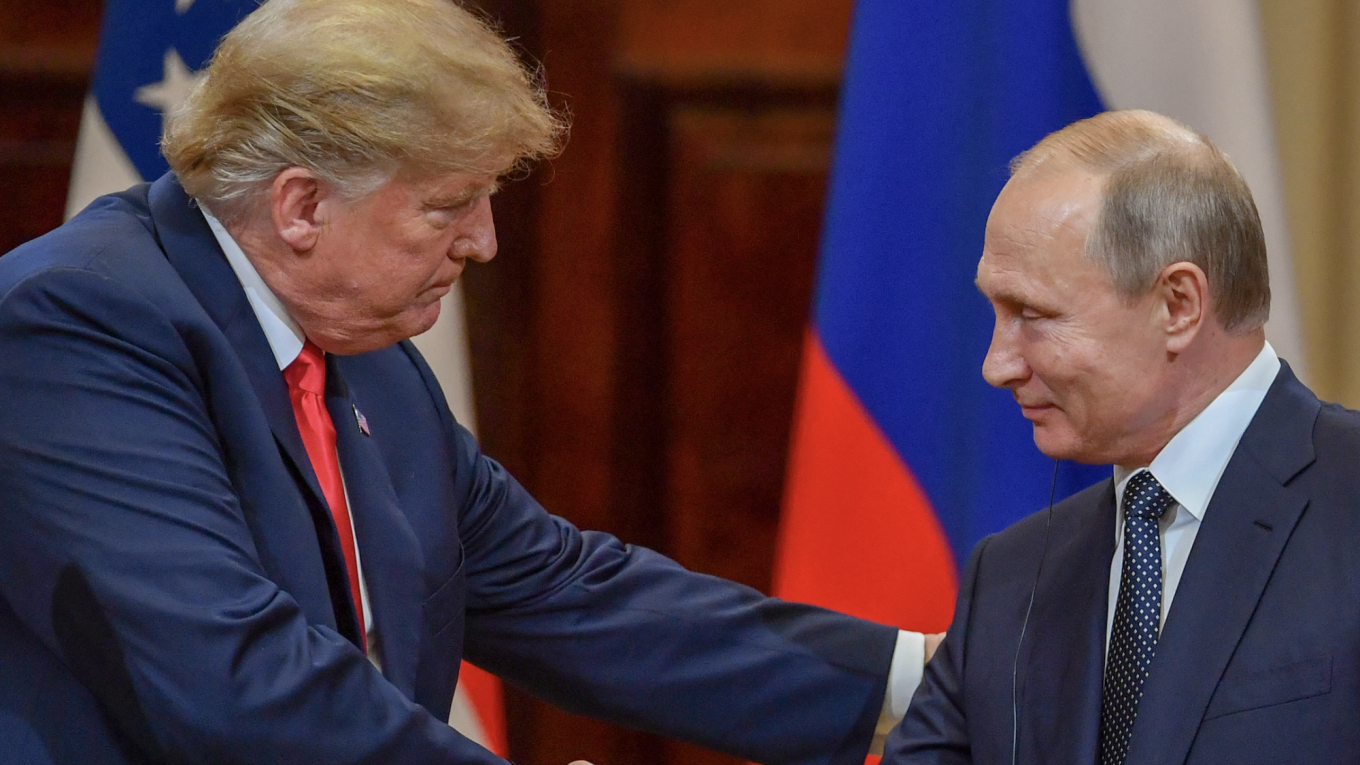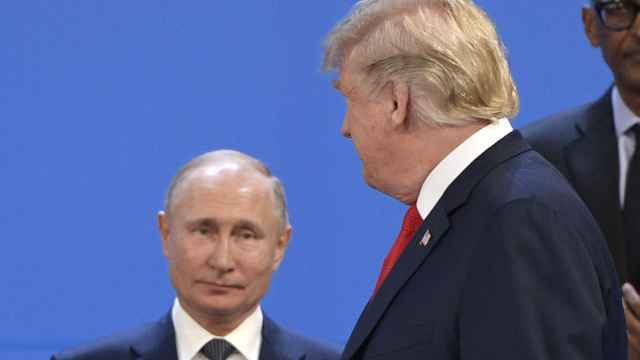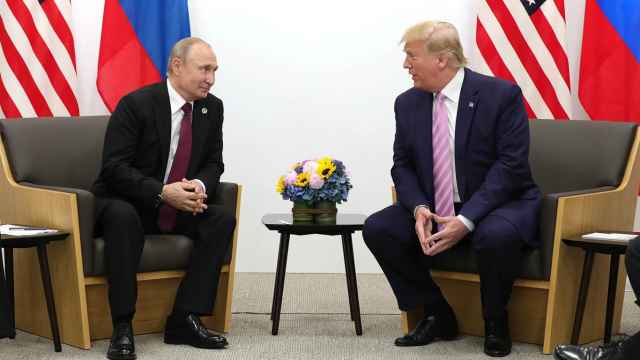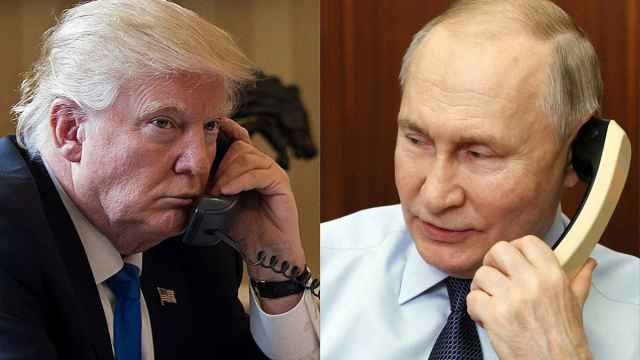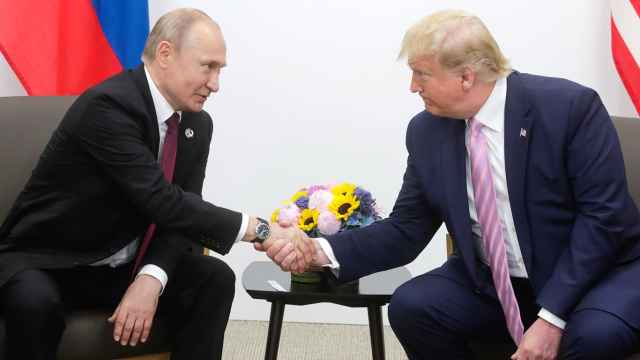President Vladimir Putin and his U.S. counterpart Donald Trump were all smiles as they shook hands during their first official summit in Helsinki in 2018, with both leaders promising to restore relations.
Today, the former KGB agent and the former real-estate mogul will meet in Alaska against a very different backdrop: the war in Ukraine is in its fourth year, relations are in tatters and Cold War-era rhetoric is making a comeback.
The two leaders will enter the talks, aimed at ending the war in Ukraine, with very different goals.
But experts say Putin has already scored a key victory before he has even sat down at the negotiating table.
"The meeting is already overall very much a victory for Putin,” said Tinatin Japaridze, an analyst with Eurasia Group. “It puts him in a more favorable position and he is leveraging it to further his objectives.”
"It is a way to buy time, delay further U.S. sanctions and in the meantime solidify military gains on the battlefield,” she told The Moscow Times. “And on top of that, Putin is trying to use this opportunity to re-engage with Trump directly and, in doing so, drive a wedge between the U.S. and Europe.”
Putin and Trump will meet at 11:30 a.m. local time in Alaska, a former Russian territory sold to the U.S. in 1867. In addition to its logistical and security advantages, the location has been seen by many as symbolic for its historical ties to Russia.
The White House said the idea for the peace talks came from Putin, and that Trump agreed to host the meeting despite mounting frustration with Moscow's repeated refusals to agree to a ceasefire.
Though talks will be primarily focused on Ukraine, other issues will also be discussed, Kremlin foreign policy aide Yuri Ushakov said.
Rounding out the Russian delegation are Foreign Minister Sergei Lavrov, Defense Minister Andrei Belousov, Finance Minister Anton Siluanov and economic envoy Kirill Dmitriev.
Putin and Trump will also have a "one-on-one" meeting with with their interpreters followed by a joint press conference — the first joint press conference between a U.S. and Russian leader since the 2018 summit in Helsinki.
For Trump, Japaridze argued, the meeting “is a way to re-engage with Russia on his terms.”
“That's one of the reasons why he wants to ensure that there's more discussed at the summit than just the war in Ukraine and any ceasefire-related negotiations,” Japaridze told The Moscow Times.
Ruth Deyermond, a senior lecturer in post-Soviet security at King’s College London’s Department of War Studies, said the optics of the meeting confirm suspicions about the Trump administration’s upending of U.S. foreign policy.
Welcoming Putin, who is wanted by the International Criminal Court on war crimes charges, to a U.S. state that was once Russian territory “is a shocking confirmation of Washington’s pivot away from its traditional allies and toward Moscow,” Deyermond wrote in an op-ed for The Moscow Times.
“Friday’s summit is an extraordinary signal of the realignment of U.S. foreign policy under Trump and of the way that the administration’s lack of expertise and understanding is creating unprecedented advantages for the Kremlin,” Deyermond said.
Ukrainian President Volodymyr Zelensky was sidelined from the negotiations despite multiple calls from Kyiv and European allies that the war-torn country must take part in talks that determine its future.
Moscow currently occupies about 20% of Ukraine’s territory and insists that these lands be formally recognized as Russian as a condition for peace.
Ahead of the summit, Zelensky repeated that his country "won't give land to the occupier" and that "any decisions without Ukraine are also decisions against peace."
“I told the president of the United States and all our European colleagues: ‘Putin is bluffing.’ He is trying to apply pressure on all fronts of the Ukrainian front ahead of the Alaska meeting,” Zelensky said Wednesday.
“I think if you're not at the table, you're on the menu,” said Edward Lucas, a senior fellow at the Center for European Policy Analysis, referring to Ukraine’s absence from the talks.
Inviting Putin to talks in the U.S., Lucas argued, runs counter to the West’s policy of sanctions and isolation that has been in place since the invasion.
“We've been trying since 2014, and particularly since 2022, to treat Russia like a pariah and isolate Russia economically, diplomatically and politically. And the end of this is that Putin is treated like a VIP. So it's already a huge victory for him,” Lucas told The Moscow Times.
Alexander Baunov, a senior fellow at the Carnegie Endowment for International Peace, shared a similar view.
“By agreeing to a one-on-one meeting on Ukraine before a ceasefire, Trump has already made a concession and therefore risks more than Putin,” Baunov said.
Trump had previously threatened to hit Moscow with steep secondary sanctions if it did not agree to a ceasefire by Aug. 8, an ultimatum that went unheeded by the Kremlin.
“If Putin refuses to agree to a ceasefire, Russian oil trade will fall under secondary sanctions — the effectiveness of which Trump himself doubts,” Baunov said.
“[Trump] would also have to continue supplying Ukraine with weapons, even if financed by Europe, or even provide it with long-range missiles — a step toward direct conflict with Russia without any guarantee of turning the war in Ukraine’s favor. Leaving the summit empty-handed would be uncomfortable for Trump, and this, allies fear, could push him toward agreeing to various ploys by Putin,” Baunov said.
Trump said he believes Putin intends to “make a deal” to end the war in Ukraine at the summit, adding that he was planning a second meeting with both Putin and Zelensky afterward.
On Thursday, Putin said that “our engagement with the present U.S. administration, which, as everyone knows, has been making what I consider to be fairly vigorous and sincere efforts to halt hostilities, resolve the crisis, and reach agreements.”
“The aim is to establish long-term conditions for peace not only between our countries but also in Europe and indeed globally,” Putin said.
But experts fear that Ukraine could be pressured into accepting unfavorable terms after the summit from which it was excluded, despite European allies’ efforts.
This week, Zelensky met with British Prime Minister Keir Starmer in London and took part in talks in Berlin between Trump and European leaders, who hoped to convince Washington to respect Ukraine’s interests when negotiating with the Russians.
“I think that message [from European allies] was heard by Trump and he did sort of come out of it trying to portray to everyone that he will take Ukraine’s interests into consideration going into these talks,” Japaridze said.
“While Ukraine is currently excluded from direct talks, recent indications — especially Trump’s stated intention to call Zelensky immediately after the summit — suggest that Ukrainian involvement in these negotiations may soon follow,” Japaridze said.
While Trump “is not going to Alaska to necessarily represent Ukrainian interests per se,” she added, “Zelensky’s absence from the Alaska meeting at this time, though far from ideal for Kyiv, appears less concerning than it did even a week ago.”
“This does raise concerns that the U.S. and Russia might pursue an understanding at Europe's or Ukraine's expense, but that remains to be seen.”
A Message from The Moscow Times:
Dear readers,
We are facing unprecedented challenges. Russia's Prosecutor General's Office has designated The Moscow Times as an "undesirable" organization, criminalizing our work and putting our staff at risk of prosecution. This follows our earlier unjust labeling as a "foreign agent."
These actions are direct attempts to silence independent journalism in Russia. The authorities claim our work "discredits the decisions of the Russian leadership." We see things differently: we strive to provide accurate, unbiased reporting on Russia.
We, the journalists of The Moscow Times, refuse to be silenced. But to continue our work, we need your help.
Your support, no matter how small, makes a world of difference. If you can, please support us monthly starting from just $2. It's quick to set up, and every contribution makes a significant impact.
By supporting The Moscow Times, you're defending open, independent journalism in the face of repression. Thank you for standing with us.
Remind me later.



